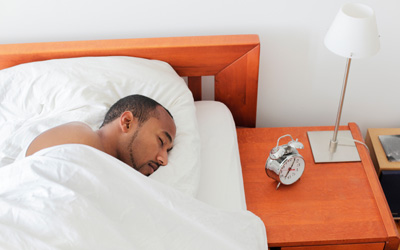



Schoolwork’s demanding, housing is noisy, and your social life calls, so it might feel like sleep is optional. It’s not! Sufficient sleep is essential for a healthy body, optimal cognitive function, and a stable mood. In other words, it’s a key to academic success.
There are many reasons your body loves sleep.
A 2004 study of hunger and sleep discovered that well-rested subjects had higher levels of leptin, the hormone which signals fullness, and lower ghrelin amounts, an appetite stimulator. When subjects were sleep-deprived, these switched.
Result: Participants felt less hungry when well rested.

Nearly 70 percent of respondents to the recent Student Health 101 survey said they have a before-bed routine, and most devote more than 20 minutes to unwinding. That might seem like time you could spend doing something “productive,” but in fact, preparing for sleep will improve its quality, and that will improve your productivity exponentially.
Simply put, bedtime routines work. Students say that having one helps them fall asleep faster, sleep better, and wake up refreshed. “It helps me clear my head and relax,” says Nat C., a sophomore at Metro State University of Denver in Colorado. “I generally wake more rested and less stressed the next day.”
Skimping on Sleep to “Have More Time”
“Sometimes I can’t fall asleep because my mind will keep racing and thinking about everything I need to get done,” says Sophie K., a junior at Lawrence University in Appleton, Wisconsin. Maximizing your time management can help you offload stress and organizing your time prevents late-night rushes to finish assignments.
Here are some simple tips:
Wind Down
Bid the day farewell with a relaxing routine. Survey respondents suggest:
Kate B., a junior at Winona State University in Minnesota, notes, “It’s incredible how just five minutes of stretching before bed helps me fall asleep.”
Power Down
Turn off the tech at least an hour before bedtime. Dr. Roxanne Prichard, a sleep expert at the University of St. Thomas in St. Paul, Minnesota, says, “Exposure to light, especially bluish light or short wavelength light [in electronics], suppresses melatonin-the hormone that [tells] your body it’s time to go to bed.”
Margaret K., a junior at the University of South Carolina in Columbia, says, “I try not to use technology (or eat or do homework) in my bed, just to reinforce that when I get in, it’s for sleeping.”
Get Comfortable
Your sleepy body needs quiet and darkness, but many shared living spaces are the opposite.
Communicate With Roommates
Roommates may not share your schedule, so talk about how to work around one another’s needs.
Charles Corva, a licensed clinical social worker in Stockbridge, Georgia, suggests finding what works for you, and once you find your sleep-inducing groove, repetition is key. Your body will start to recognize your habits as cues to prepare for sleep.
Victoria E., a senior at Fitchburg State University in Massachusetts, says, “I usually feel more relaxed and have a better night’s sleep [when] I unwind.”
It might be tempting to disregard bedtime routines as childish, but settling into one can help you rise and shine tomorrow.
College students need eight to nine hours of sleep a night for optimal functioning. Are most getting enough?
Here are some slumber stats:
Sandra McGill is a freelance writer and editor, studying journalism and biology at Georgia State University.




